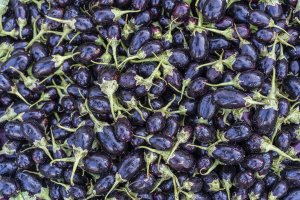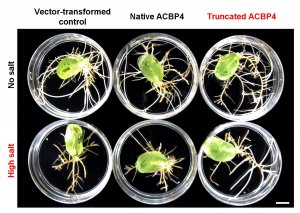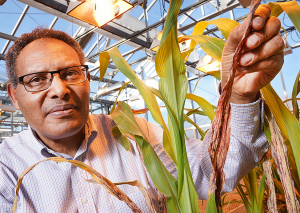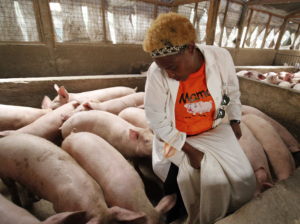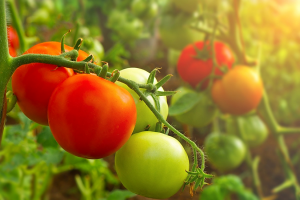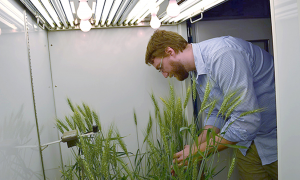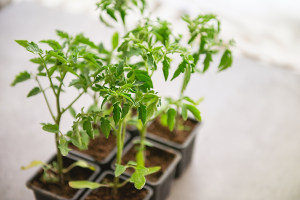Cornell University announced that it received an award grant from the United States Agency for International Development (USAID) to continue the efforts to bring genetically engineered (GE) eggplant varieties to farmers in Bangladesh and the Philippines. USAID has provided Cornell's Feed the Future Insect-Resistant Eggplant Partnership a grant amounting to US$10 million as part of the Feed the Future initiative by the US government.
Scientists from the University of Hong Kong have identified the molecular mechanisms that activate salt-induced adaptive changes in soybeans, which could lead to finding solutions for saline agriculture. The research team examined soybean roots in salt solution and found Class II ACBP3 and ACBP4 variant proteins smaller than the native forms emerged during the first few hours of treatment. The researchers also found that the overexpression of the native and truncated ACBP4 rendered soybean hairy roots more salt-sensitive and salt-tolerant than the control plant.
The newly discovered gene, called Anthracnose Resistance Gene1, or ARG1, confers broad protection from the fungal diseases anthracnose, rust, and target spot. Tesfaye Mengiste, a professor and interim head of Purdue's Department of Botany and Plant Pathology said it is remarkable that a single gene leads to resistance across a broad spectrum of fungi and multiple strains of the anthracnose fungus.
South African seed industry organizations led by the South African National Seed Organization (SANSOR) released a joint statement after the National Department of Agriculture, Land Reform and Rural Development (DALRRD) announced that products derived from new breeding technologies will be evaluated under the risk assessment framework used for genetically modified organisms. In the statement, the seed industry organizations highlighted the possible detrimental effects of the decision on the nation's agricultural industry.
Livestock farmers in Kenya are staring at a bleak future following a dire shortage of livestock feeds, a situation that has exorbitantly pushed up livestock production costs in the country. Now, farmers are appealing to the Government to allow importation of genetically modified (GM) feed ingredients which are relatively cheap and readily available on the global market.
To understand what people of different ages and sexes eat and drink in countries around the world, you can visit the FAO/WHO Global Individual Food consumption data tool. This platform presents food consumption data, at the individual level, from different regions of the world. Collected through both large nationwide surveys and small-scale surveys, the data provides important food-based indicators for food consumption, nutrition and food safety.
Investing in clean, affordable and sustainable energy solutions plays a crucial role in ending poverty and hunger. It can also spur innovation, generate millions of green jobs and help create a just, equitable, net-zero emissions future that leaves no one behind. For the 759 million people in the world who lack access to electricity and the 2.6 billion without clean cooking facilities, access to clean energy solutions can also improve vital services such as healthcare and education.
Transgenic tomatoes developed by researchers in Egypt were found to combat drought thanks to a transcription factor involved in the expression of drought responsive genes. The findings can help improve tomato production in the future, as the crop's productivity is highly restricted by drought stress. The OsDREB2A gene was introduced to two tomato genotypes through Agrobacterium-mediated transformation, specifically by incubating cotyledon leaf explants in Agrobacterium suspension. After eight weeks, the transgenic tomatoes were regenerated.
The scientists are subjecting more than a dozen wheat varieties to two major stressors. The first comes from exposure to carbon dioxide (CO2) levels of up to 1,000 parts per million—an atmospheric concentration of the greenhouse gas projected for the turn of the century absent mitigation measures. The other stressor is infection by the insidious fungus Fusarium graminearum. This fungus causes head blight, a costly disease of wheat, barley, and oat crops worldwide that can damage the grain and contaminate it with mycotoxins, rendering the grain unsafe for food or feed use.
Northeast Agricultural University researchers used CRISPR-Cas9 to investigate the role of transcription factor Solanum lycopersicum salt-related MYB1-like (SlSRM1-like) in tomato leaf development. The results are published in BMC Plant Biology. Several factors affect leaf development, such as the growth environment, gene expression, and hormone synthesis.


 Curently online :
Curently online :
 Total visitors :
Total visitors :
